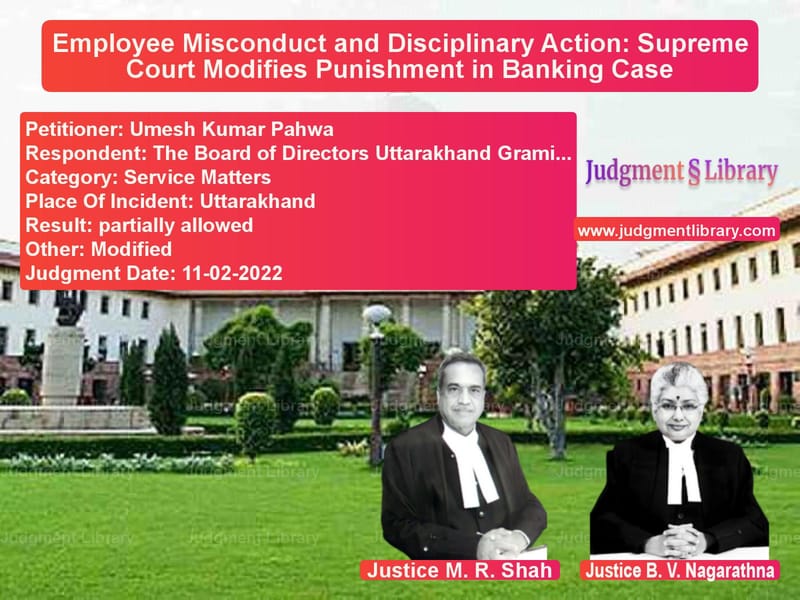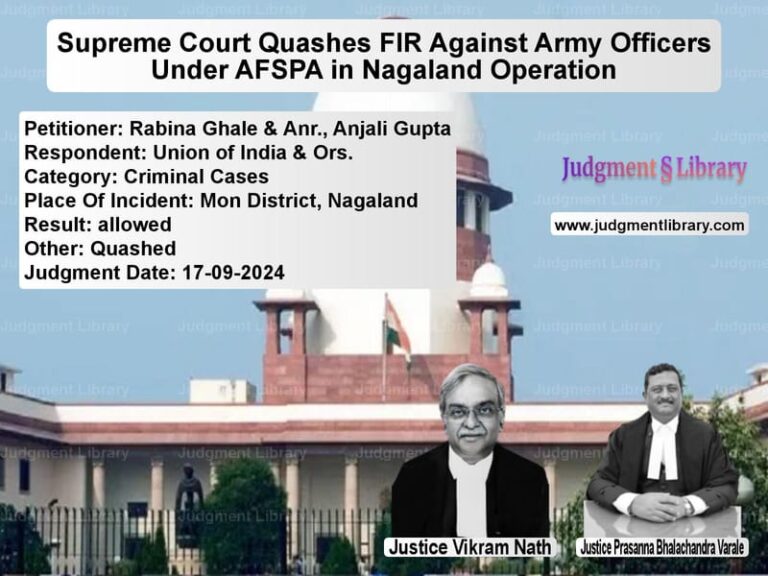Employee Misconduct and Disciplinary Action: Supreme Court Modifies Punishment in Banking Case
The Supreme Court of India recently delivered a significant judgment in the case of Umesh Kumar Pahwa vs. The Board of Directors Uttarakhand Gramin Bank & Ors., addressing allegations of misconduct against a bank officer and the proportionality of disciplinary actions. The case underscores the principles of natural justice, the scope of judicial review in disciplinary matters, and the concept of proportionality in awarding punishments.
Background of the Case
Umesh Kumar Pahwa, an officer of Uttarakhand Gramin Bank, was charged with multiple allegations related to financial mismanagement and breach of duty while serving as a branch officer. A complaint was filed against him in 2008, alleging that he sanctioned a loan limit of ₹1,50,000, which was later reduced to ₹75,000. Several other complaints followed, leading to disciplinary proceedings against him.
Key developments in the case:
- The appellant was issued a charge sheet containing ten charges, including financial mismanagement, misuse of official position, and violation of banking procedures.
- An internal inquiry found him guilty of most charges, leading to his dismissal from service.
- The appellant challenged his dismissal before the Uttarakhand High Court, which upheld the disciplinary authority’s decision.
- He further approached the Supreme Court, contesting the findings of the inquiry and the severity of the punishment.
Petitioner’s Arguments
- The appellant contended that the allegations against him were baseless and motivated by bias.
- He argued that his actions did not cause financial loss to the bank and were in the bank’s best interest.
- The punishment of dismissal was disproportionate to the alleged misconduct.
- He pointed out his 28 years of unblemished service, emphasizing that the disciplinary action was excessive.
Respondent’s Arguments
- The bank defended its disciplinary action, stating that the officer had violated established banking protocols.
- It asserted that his actions had tarnished the bank’s reputation and justified strict disciplinary measures.
- The bank contended that the inquiry followed due process, and the findings were based on substantial evidence.
Supreme Court’s Judgment
The Supreme Court modified the punishment, converting the dismissal from service to compulsory retirement. The Court’s key observations included:
- There was no proven financial loss to the bank, and the appellant had acted in the bank’s interest while sanctioning the loan.
- The disciplinary authority failed to establish a direct link between the alleged misconduct and any significant damage to the bank.
- The appellant’s long service record and the nature of the charges warranted a less severe penalty.
- The doctrine of proportionality must be applied in disciplinary cases, ensuring that punishment aligns with the gravity of the offense.
Key Excerpts from the Supreme Court Judgment
The Court noted:
“Even looking to the charges proved in the departmental proceedings, we find that as such, there is no financial loss caused to the Bank and on the contrary, a decision was taken by the appellant to reduce the loan amount, which can be said to be in the bank’s interest.”
On proportionality, the Court observed:
“The punishment of removal for the charges proved and the misconduct established is too harsh and disproportionate. However, considering the fact that it can be said to be a case of loss of confidence in the employee by the Bank, we deem it just and proper to substitute the punishment from that of removal of service to that of compulsory retirement.”
Final Verdict
The Supreme Court modified the High Court’s decision as follows:
- The appellant’s removal from service was substituted with compulsory retirement.
- He was granted all retirement benefits applicable to compulsory retirement.
- The Court remanded his pending claim for promotion to the High Court for fresh consideration.
Conclusion: Implications of the Judgment
This ruling highlights critical principles in employment law and disciplinary proceedings:
- Judicial review in disciplinary matters is limited but extends to ensuring fairness and proportionality in punishment.
- Long service records and absence of financial loss can influence the severity of disciplinary actions.
- Employers must balance disciplinary actions with considerations of fairness and the overall impact on the institution.
- The judgment reinforces that disciplinary penalties should not be unduly harsh and should align with the nature of the misconduct.
The ruling sets a precedent for similar employment disputes, ensuring that disciplinary actions are proportionate and just, particularly in cases involving long-serving employees.
Petitioner Name: Umesh Kumar Pahwa.Respondent Name: The Board of Directors Uttarakhand Gramin Bank & Ors..Judgment By: Justice M. R. Shah, Justice B. V. Nagarathna.Place Of Incident: Uttarakhand.Judgment Date: 11-02-2022.
Don’t miss out on the full details! Download the complete judgment in PDF format below and gain valuable insights instantly!
Download Judgment: umesh-kumar-pahwa-vs-the-board-of-directo-supreme-court-of-india-judgment-dated-11-02-2022.pdf
Directly Download Judgment: Directly download this Judgment
See all petitions in Employment Disputes
See all petitions in Disciplinary Proceedings
See all petitions in Public Sector Employees
See all petitions in Termination Cases
See all petitions in Pension and Gratuity
See all petitions in Judgment by Mukeshkumar Rasikbhai Shah
See all petitions in Judgment by B.V. Nagarathna
See all petitions in partially allowed
See all petitions in Modified
See all petitions in supreme court of India judgments February 2022
See all petitions in 2022 judgments
See all posts in Service Matters Category
See all allowed petitions in Service Matters Category
See all Dismissed petitions in Service Matters Category
See all partially allowed petitions in Service Matters Category







